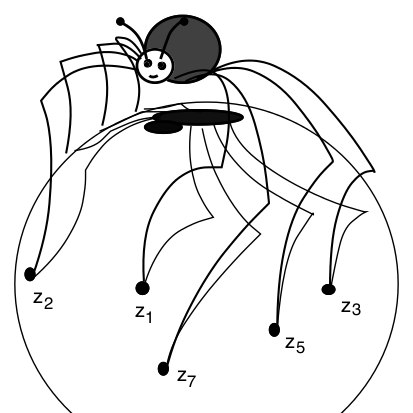Guided Research Policies
Mathematics
Applied and Computational Mathematics
Spring 2012
Guided Research allows study, typically in the form of a
research project, in a particular area of specialization that is
not offered by regularly scheduled courses. Each participant must
find a member of the faculty as a supervisor, and arrange to work
with him or her in a small study group or on a one-on-one
basis.
Guided research has three major components: Literature study,
research project, and seminar presentation. The relative weight of
each will vary according to topic area, the level of preparedness
of the participant(s), and the number of students in the study
group. Possible research tasks include formulating and proving a
conjecture, proving a known theorem in a novel way, investigating a
mathematical problem by computer experiments, or studying a problem
of practical importance using mathematical methods and/or numerical
simulation.
Third year students in Mathematics and ACM are advised to take
1-2 semesters of Guided Research. The Guided Research report in the
spring semester will typically be the Bachelor Thesis which is a
graduation requirement for every Jacobs undergraduate. Note that
the Bachelor's Thesis may also be written as part of any other
course by arrangement with the respective instructor of record.
Please note the following deadlines, which are
strict.
| |
Choice of advisor |
|
End of week 4 |
|
| |
Semester Plan |
|
End of week 6 |
|
| |
Report draft |
|
Before presentations |
|
| |
Project Presentation |
|
Thursday/Friday afternoon of week 14 |
|
| |
Report due |
|
Last day of exam period |
|
| |
Choice of advisor |
|
Add and drop deadline |
|
| |
Semester Plan |
|
End of week 4 |
|
| |
Report draft |
|
Before presentation |
|
| |
Project Presentation |
|
Thursday/Friday afternoon of week 13 |
|
| |
Report due |
|
One week before grades for graduating students are
due |
|
For the Spring Semester 2012, the deadlines are as follows.
| |
Choice of advisor |
|
February 22, 2011 |
|
| |
Semester Plan |
|
March 1, 2011 |
|
| |
Report draft |
|
No hard deadline, but before project
presentation |
|
| |
Project Presentation |
|
May 10-11 |
|
| |
Report due |
|
May 24, 2011 |
|
The final grade is composed of three contributions: Semester
plan 10%, project presentation 30%, and final report 60%.
The choice of advisor is the student's responsibility. It must
be announced to the instructor of record (Marcel Oliver for Fall
2011) by email by the deadline given above. Advisors will not be
assigned by the instructor of record. A change of advisor after
the deadline must be discussed with the instructor of record.
The semester plan shall define the goals for the semester at an
early stage. It should contain, if applicable to the particular
project, a concise formulation of the scientific question, a
motivational example, an easy special case, a brief summary of
prior work, a work plan, and an initial list of references. The
plan shall typically not exceed 1-3 typeset pages.
It is understood that not all goals may ultimately be attained,
or that goals may change. Nonetheless, it is very important that
the process of defining goals is initiated early.
A copy of the semester plan must be submitted to the advisor and
to the instructor of record; the grade is determined by the advisor
in consultation with the instructor of record.
The presentation is graded by the advisor in consultation with
other faculty present according to the following criteria:
- Clarity. Is the material presented clearly? Are the
mathematical or scientific questions well motivated? Is the core
structure of the argument exposed? Can somebody who is not an
expert in the field understand what you have done?
- Competence. Show that you understand the subject. Answer
questions concisely; admit if a question exceeds what you can say
on the spot.
You should also take the following points into account.
- Timing. The talk is 20 minutes plus 10 minutes for
questions. Don't rush, find a good pace that the audience can
follow.
- Presentation material. Is the writing on the blackboard
well organized? Aren't you writing too much or too little? If you
use slides, aren't the slides overloaded? Is the text
readable?
- Presentation style. Does your presentation motivate the
audience? Is your oral communication style lively and interactive?
Is there even some stretch of suspense in your presentation? Does
your oral account give an extra over the written material?
The scientific quality of your work is evaluated as part of your
report grade. The evaluation of the report is primarily based on
the following.
- Originality. Any intellectual ``add-on'' beyond what the
supervisor put in?
- Soundness. Mathematical correctness, professional
implementation, sound interpretation of results, all claims
supported?
- Completeness. Given the time constraints, did the
project work exhaust the possibilities to be explored?
Grading will also take the following formal requirements into
account.
- Organization. Is the report logically structured? Are
summary, introduction, conclusions, and references adequate?
Meaningful sectioning?
- Writing style. Clear formulations? Good text flow?
Appropriate language (not sloppy in technical sections, not too dry
in motivation sections)? Correct English?
- Layout. Length, general visual appearance, good quality
symbols, figures, captions?
- Timeliness. Was the draft of the report delivered on
time (on the day of the presentation)? Final submission on
time?
The final report is graded by the advisor. For Bachelor Theses,
student and/or advisor must find a second reader.
Students may do their Guided Research work with an advisor in a
different field, provided the topic is suitable. When choosing an
external advisor,
- the deadlines and policies above must be followed;
- a faculty member from Mathematics or Applied and Computational
Mathematics must be designated as a co-advisor before the
choice-of-advisor deadline.
|







